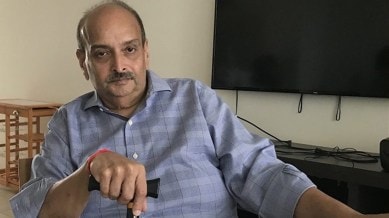Stay updated with the latest - Click here to follow us on Instagram
No evidence of unfair trial in India: Belgian court on Mehul Choksi’s plea
Mehul Choksi, who was arrested in Belgium on April 11 based on an extradition request by the CBI, can now appeal against the court’s preliminary judgment before the Belgian Supreme Court.

A court in Belgium rejected fugitive diamantaire Mehul Choksi’s arguments, ranging from violation of his right to a fair trial to indications that he is subject to a political trial, as “irrelevant” and “in no way detract from the foregoing”.
Choksi, who was arrested in Belgium on April 11 based on an extradition request by the CBI and lodged in an Antwerp prison since then, is wanted in India in connection with the alleged Rs 13,000 crore Punjab National Bank (PNB) loan fraud case. Last month, a Belgian court turned down Choksi’s bail plea.
The court last week has also found he has failed to demonstrate any serious risk of being subjected to torture, inhuman or degrading treatment.
Choksi can appeal against the Court of Appeal’s preliminary judgment before the Belgian Supreme Court within 15 days, a source said.
A four-member indictment chamber at the Court of Appeals in Antwerp has found no infirmity in the orders issued by the pre-trial chamber of the Antwerp district court on November 29, 2024, allowing Choksi’s extradition.
The district court had termed the arrest warrants issued by a Mumbai special court on May 23, 2018 and June 15, 2021 enforceable, which has been upheld by the Court of Appeals in its order dated October 17. The third warrant, related to disappearance of evidence, was not accepted by the Belgian court.
Rejecting Choksi’s arguments, the Court of Appeals held the documentation provided by him is insufficient to make it concretely plausible that he personally faces a real, present and serious risk of being subjected to flagrant denial of justice, torture or inhuman and degrading treatment in India.
The ruling comes a month after the Indian government gave a letter of assurance to the Belgian government that described the conditions in which Choksi would be incarcerated in India, if he were to be extradited. In a letter on September 4 to Belgian authorities, Rakesh Kumar Pandey, Joint Secretary, Ministry of Home Affairs, said the Indian government was seeking Choksi’s extradition so that he could face trial in India.
In his appeal, Choksi claimed there was a violation of Article 6 of the ECHR I (right to a fair trial) if he were to be extradited.
However, the court order said, “Referring to reports from non-governmental organisations, the person concerned questions the independence of the judiciary in India. However, the person concerned does not cite any substantial elements that would allow the indictment chamber to conclude that there is a real risk of violation of the right to a fair trial on the part of the person concerned due to a lack of independence of the Indian judges.”
“He also argues in conclusion that there are indications that he is the subject of a political trial, but this is by no means made plausible,” it said. “The offences cannot be considered political, military or fiscal offences not subject to extradition, and there are no reasons to believe that the extradition request was made with the intention of prosecuting or punishing a person on the basis of their race, religion, nationality or political opinion, nor does the position of the person concerned appear to be adversely affected for any of these reasons.”
“The person concerned claims that it is impossible to receive adequate care for his precarious state of health, both physical and mental, in an Indian prison, without, however, substantiating this claim,” the court said.
On Choksi’s kidnapping claim, the court said the records submitted by him do not conclusively indicate he was the victim of a kidnapping in Antigua ordered by Indian authorities.
The order of the Commission for the Control of Interpol’s Files (CCF) – an independent body that ensures that all personal data processed through the Interpol’s channels conforms to the rules of the organisation – that allowed the Interpol Red Notice against Choksi to be dropped on the grounds of alleged kidnapping, was cited by Choksi in Belgium to buttress that he may be tortured in India.
The Court of Appeals said the CCF’s October 12, 2022 decision provides no clarity on the matter and is formulated cautiously and conditionally. Choksi did not cite any substantial document that would allow the indictment chamber to conclude that there is a real risk of violation of his right to a fair trial due to the alleged lack of independence of Indian judges, it said.